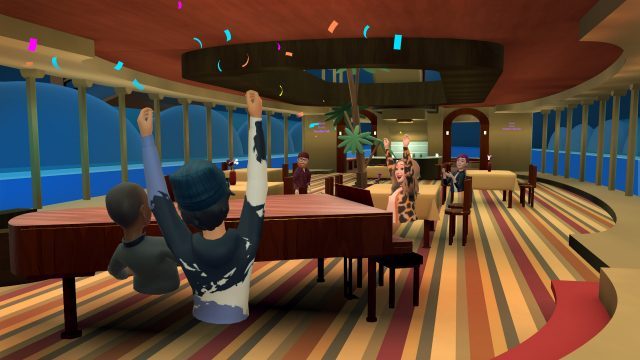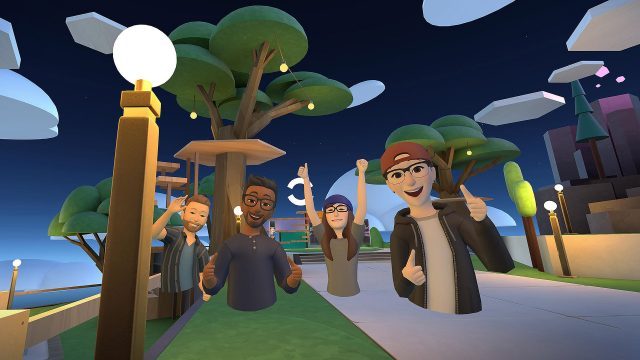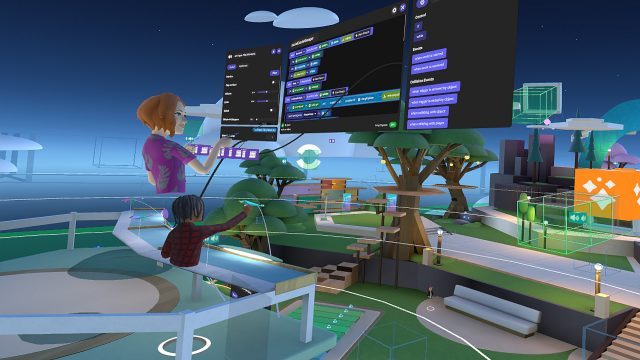Nearly two and a half years in the making, Meta’s most ambitious social VR project, Horizon Worlds, has finally reached open beta. Well kinda. Starting today, the platform is available to those in the US & Canada who are 18 years old or older—on Quest 2 and Oculus PC. If you’re part of that group you’ll be able to jump in to explore worlds made on the platform and get your hands on the app’s stunningly impressive collaborative building tools.
Horizon Worlds was initially announced back in 2019 as Facebook Horizon. Since then, Facebook has changed its name to Meta and Facebook Horizon has since become known as Horizon Worlds.
Despite the name change, the vision of Horizon Worlds is still the same: a social VR platform where users can build experiences with and for each other. Being a self-contained application, it’s not quite part of the metaverse yet, but it’s the company’s first big project that’s build on a foundation with many of the same ideas—like having a shared identity across interconnected, immersive experiences where you can spend time with friends.

The app has been in a closed beta for more than a year, during which time the company says it’s been honing the experience with feedback from users and creators alike.
Today Horizon Worlds is finally opening its doors, at least to some. Anyone in the US & Canada that is over 18 years old is welcome to join Horizon Worlds on Quest 2 or Oculus PC (Meta is pulling the plug on support for the original Quest starting on January 13th).
I recently got a tour of the latest version of Horizon Worlds and found a very polished experience with some excellent in-game creation tools. While much of the foundation here is the same as what we’ve seen previously, various systems have been enhanced and the experience overall feels streamlined.
For example, the last time we took a look at Horizon Worlds, spaces inside the world could only hold up to 8 players at a time. Now it’s possible to fit up to 20 players in a single space, depending upon the complexity of the scene (creators can reduce the total player count in order to add more geometry, animation, logic, etc).
Another upgrade is that Horizon Worlds is now using the latest Oculus Avatar system, which replaces the previous proprietary avatar system. When you load into Horizon Worlds you’ll automatically appear the avatar that you have (probably) already configured in your headset.

Building tools have also been expanded an improved. Creators now have control over an object’s texture, material properties, and more. You can even light scenes generally (at the skybox level) and specifically (by placing lights that illuminate nearby objects). Lights aren’t dynamic (they won’t cast shadows or respond to moving objects in real-time), but they do bake quickly enough that creators can easily use the game’s built-in tools to work with lighting on-the-fly to add extra character to their scene.
Meta says that everything you see in Horizon Worlds was built completely in-game—environments, game-logic, scoreboards, and… well, everything.
The building tools in Horizon Worlds are collaborative at their core. You can build collaboratively with up to four friends at a time, and everything that you see and do is synchronized between users, making for a feeling of co-creation that’s really powerful. This even applies to the scripting panel (which allows users to add logic to their creations); if you make even a tiny change to a script, your friend next to you will see the change reflected on their end too—great for helping each other debug, I’m sure.

It’s a impressively powerful and easy to use set of tools, and I expect creators so far are only just scratching the surface of what’s possible. Alongside the open beta release, Meta has published a comprehensive introduction to everything from building to scripting to publishing in Horizon Worlds.
– – — – –
Horizon Worlds is an impressively sleek package, even in its beta form. Whether or not it sees real traction is likely to come down to the quality of content available on the platform and how easy it is for the best content to be discovered and shared by users.
That can be a chicken-and-egg problem, of course. Sensing this, Meta recently announced a $10 million fund to try to kickstart creator projects on the platform, but hasn’t commented on plans to create any structured compensation for creators spending their time building on the platform. That might make it hard for Horizon Worlds to attract high quality creators who might otherwise choose to spend their time building on platforms that offer structured, real-money payouts, like Rec Room or Roblox.






